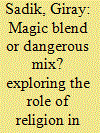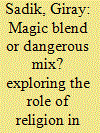| Srl | Item |
| 1 |
ID:
116399


|
|
|
|
|
| Publication |
2012.
|
| Summary/Abstract |
In the aftermath of 9/11, Islam has been put at the heart of heated debates about the role of religion in foreign policy. In the following year of 2002, the election of the Justice and Development Party (AKP) to government has brought new questions to the table about how Turkey can respond to the changes in its transforming environment, and whether Turkey would transform its foreign policy. Considering the moderate Islamist background of the AKP government and its pro-active foreign policy toward Muslim countries, there is a need to explore the processes of how Islam has become an appealing ground for constructing an identity-based Turkish foreign policy. To project if (or how) this transformation is likely to last beyond the AKP, one needs to delineate how Islam interacts with geopolitics when crafting Turkish foreign policy. The article explores this interaction within the context of transforming Turkish foreign policy by benefitting from theoretical insights of constructivism and realism.
|
|
|
|
|
|
|
|
|
|
|
|
|
|
|
|
| 2 |
ID:
116400


|
|
|
|
|
| Publication |
2012.
|
| Summary/Abstract |
In the aftermath of 9/11, Islam has been put at the heart of heated debates about the role of religion in foreign policy. In the following year of 2002, the election of the Justice and Development Party (AKP) to government has brought new questions to the table about how Turkey can respond to the changes in its transforming environment, and whether Turkey would transform its foreign policy. Considering the moderate Islamist background of the AKP government and its pro-active foreign policy toward Muslim countries, there is a need to explore the processes of how Islam has become an appealing ground for constructing an identity-based Turkish foreign policy. To project if (or how) this transformation is likely to last beyond the AKP, one needs to delineate how Islam interacts with geopolitics when crafting Turkish foreign policy. The article explores this interaction within the context of transforming Turkish foreign policy by benefitting from theoretical insights of constructivism and realism.
|
|
|
|
|
|
|
|
|
|
|
|
|
|
|
|